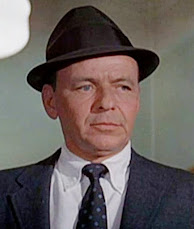 |
| Stewart as Biegler pleads his case. |
Otto Preminger’s enthralling motion picture requires multiple viewings to be fully appreciated. When I first saw it, I focused on the riveting story, which treats the viewer much like the jury. We listen to testimonies, watch the lawyers try to manipulate our emotions, and struggle to make sense of the evidence. When I saw Anatomy of a Murder a second time, I knew the case’s outcome and was to able to concentrate on the splendid performances. James Stewart, Arthur O’Connell, and George C. Scott earned Oscar nominations, but the rest of the cast is also exceptionally strong. In subsequent viewings, I’ve come to appreciate the film’s well-preserved details, from the small town upper-Michigan atmosphere to Preminger’s brilliant direction (e.g., in one shot, as Scott's prosecutor cross-examines a witness in close-up, Stewart—the defending lawyer—is framed between them in the background).
 |
| Lee Remick and George C. Scott. |
Perhaps, it’s those very drawbacks that attract Biegler to the case. With a newly sober McCarthy assisting him, Biegler builds his defense around an old Michigan case in which a man was acquitted of murder because he acted out of “irresistible impulse.” As a psychiatrist (Orson Bean in a great bit part ) explains on the stand, it didn’t matter if Manion knew the difference between right and wrong. He was compelled to act (in the words of another witness, he was a “like a mailman delivering the mail”).
 |
| Saul Bass's opening credits as justly famous. |
At the time of its release, Anatomy of a Murder was quite controversial, much of it stemming from the frank discussion of the crime. Preminger seemed to relish in breaking barriers on film content. His sex comedy The Moon Is Blue (1953) shocked audiences with its plot about older men (David Niven and William Holden) pursuing a young virgin. Preminger’s The Man With the Golden Arm (1955) was one of the first mainstream films about drug addiction.
Our favorite Preminger works are the film noir classic Laura (1944), Bunny Lake Is Missing (1965), and, of course, this one. You may disagree with me on whether it's the finest courtroom drama, but I'm not alone in my assessment. Back in 2021, I interviewed Michael Asimow, a professor at the Santa Clara Law School and co-author of Real to Reel: Truth and Trickery in Courtroom Movies. When I asked him what film did the best job of presenting a case realistically, he replied: "Our all-time favorite is Anatomy of a Murder. Almost all of it is a gripping murder trial, with two great lawyers going after each other, full of twists and turns and with an ambiguous ending. Watch this movie—you’ll be amazed at how good it is."










